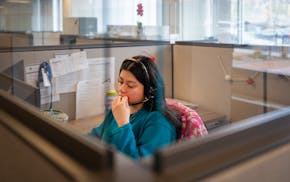It's a question any polite person will tell you to never ask: "How old are you?" For some people, posing such a question is akin to asking someone about their nightly bedtime habits while standing on their brand-new hardwood floors with dripping Minnesota snow boots and a dead rabbit.
I apparently was a super rude kid, because I remember asking my grandmother repeatedly how old she was, even though her answer was always the same: I am as old as my skin and a little bit older than my teeth.
Earlier this week people were obsessing over and sharing the How-Old.net demo app, which uses Microsoft's new face detection API to predict someone's age from a single image. I did it using the photo above and the kind robot with good manners said I was 26. 26! This thing might be the very definition of clickbait. You mean, there's a robot out there that says I look younger than I am? I can't stop singing the Replacements' "I Will Dare" ("How old are you? How young am I?"), which is a one little Wonder-breadcrumb clue that I'm not 26. (And there's another one.) But thanks for seeing deep into my soul, clickbait How Old Robot!
There's a certain age where you hit that "Don't ask, don't tell mark," and it's usually right around the time you've been pushed out of that coveted marketing-monolith defined 18-34 demographic. Suddenly, a car commercial featuring an unknown-to-you everything, like Kaylee Batta's "Everybody Let's Step it Up and Dance To This Thing" (That's a real thing, right?), becomes a stark reminder that you're in some sort of adult purgatory. Because being relevant to terrible marketers is allegedly more important than being someone who has, say, lived through two unique careers or dealt with the death a parent or leapt through 14 or so different world views that come from decades of living.
Despite the mass exodus of young people in Minnesota, Minneapolis is still a relatively young metro. The median age in the Twin Cities is about 33, compared with the rest of the country at 36.9. Yet it doesn't mean we're any more happy. In fact, research suggests the opposite. A recent poll of 100 centenarians found that, on average, they felt most attractive at age 31 and the most energetic at age 33. As far as true happiness goes, though, they didn't nail that until about age 44. And they didn't feel most content until another decade later, around age 56.
Of course, there's a difference between how old you actually are and how old you "feel." Late last year a study was released that suggested it's more important to feel young than to actually be young. In fact, the researchers warn you might die early (die! actually die!) if you don't feel young. The mortality rate over 99 months among the study volunteers (who averaged 65 years of age) who felt older than their true age was 24.6 percent, compared with 14.3 percent for those who felt much younger.
By 2050, 1 in 5 Americans will be 65 or older, the largest "older" generation yet. And if feeling younger helps peple live longer, it's a good thing, then, that the older people become, the younger they feel. Maybe by 2050 we will be traveling on high-speed trains running on kale and 100 will be the new 65 and 65 will be the new 44, and the How Old Robot will have long taken credit for helping millions of Americans feel younger and live longer. Cue the robot music.

Single adults turned away from Hennepin emergency homeless shelters 4,000 times in 2023
Winona says it needs a new police station. Some residents (and officials) aren't so sure.

Why you should donate clothing: It (probably) won't end up at the dump
